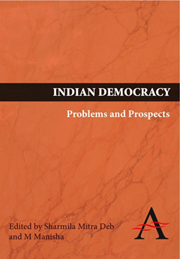Book contents
- Frontmatter
- Contents
- List of Contributors
- PREFACE
- Introduction DEMOCRATIC POLITICS IN INDIA: CONCEPTS, CHALLENGES AND DEBATES
- 1 RECONSTRUCTING DEMOCRATIC CONCERNS IN INDIA
- 2 ARE WE READY FOR DEMOCRACY? A FEW OBSERVATIONS
- 3 DEMOCRACY AND POVERTY IN INDIA
- 4 DEMOCRACY AND FEDERALISM IN INDIA: TWO EPISODES AND A SET OF QUESTIONS
- 5 INDIA'S COALITION FUTURE?
- 6 HOW DEMOCRATIC IS OUR PARLIAMENT? ELITE REPRESENTATION AND FUNCTIONAL EFFICIENCY OF LOK SABHA
- 7 DEMOCRACY'S JANUS FACE: A REVIEW OF ELECTIONS IN POST-INDEPENDENCE INDIA
- 8 THE NATURE OF THE OPPOSITION IN INDIA'S PARLIAMENTARY DEMOCRACY
- 9 RESTYLING DEMOCRACY? MAINSTREAM MEDIA AND PUBLIC SPACE VIS-À-VIS INDIAN TELEVISION
- 10 THE POOR WORKING WOMEN: THE ACHILLES HEEL OF INDIAN DEMOCRACY – A PROFILE OF THE MAIDSERVANT FROM THE BUSTEES OF KOLKATA
- 11 HOW IS DEMOCRACY IN SOUTH ASIA? A COMPARISON OF THE ELITE AND THE MASS ATTITUDES
10 - THE POOR WORKING WOMEN: THE ACHILLES HEEL OF INDIAN DEMOCRACY – A PROFILE OF THE MAIDSERVANT FROM THE BUSTEES OF KOLKATA
Published online by Cambridge University Press: 05 March 2012
- Frontmatter
- Contents
- List of Contributors
- PREFACE
- Introduction DEMOCRATIC POLITICS IN INDIA: CONCEPTS, CHALLENGES AND DEBATES
- 1 RECONSTRUCTING DEMOCRATIC CONCERNS IN INDIA
- 2 ARE WE READY FOR DEMOCRACY? A FEW OBSERVATIONS
- 3 DEMOCRACY AND POVERTY IN INDIA
- 4 DEMOCRACY AND FEDERALISM IN INDIA: TWO EPISODES AND A SET OF QUESTIONS
- 5 INDIA'S COALITION FUTURE?
- 6 HOW DEMOCRATIC IS OUR PARLIAMENT? ELITE REPRESENTATION AND FUNCTIONAL EFFICIENCY OF LOK SABHA
- 7 DEMOCRACY'S JANUS FACE: A REVIEW OF ELECTIONS IN POST-INDEPENDENCE INDIA
- 8 THE NATURE OF THE OPPOSITION IN INDIA'S PARLIAMENTARY DEMOCRACY
- 9 RESTYLING DEMOCRACY? MAINSTREAM MEDIA AND PUBLIC SPACE VIS-À-VIS INDIAN TELEVISION
- 10 THE POOR WORKING WOMEN: THE ACHILLES HEEL OF INDIAN DEMOCRACY – A PROFILE OF THE MAIDSERVANT FROM THE BUSTEES OF KOLKATA
- 11 HOW IS DEMOCRACY IN SOUTH ASIA? A COMPARISON OF THE ELITE AND THE MASS ATTITUDES
Summary
Theoretical and Empirical Background
The empowerment of women especially at their most intimate site i.e the household, is perhaps the most daunting problem of Indian democracy. If poor women, the most vulnerable section of the Indian polity, cannot achieve emancipation from the rigours of domestic oppression then the very basis of democracy is weakened. In other words, if non democratic ethos prevail in the household which is the basic unit of our democracy then the democratic superstructure of our polity becomes vulnerable. Thus, this paper attempts to address the issues that are relevant for the emancipation of the poor women within the household itself.
This paper is based on the findings of a larger study. The paper, as the title indicates, concentrates on the poor maidservant or kajerlok or thika jhee. While it evaluates the socio-economic condition of the jhee on the basis of two small samples taken respectively from a South Calcutta (Kolkata) and a North Calcutta slum (Bustee), at a more fundamental level it tries to decipher whether she (jhee) continues to be discriminated against in the most important site for her – the household. The hypotheses that will be evaluated in this paper are set out later.
Hardcore feminists argue that women's discrimination in the household is because of the prevalence of patriarchy. Patriarchy, in the Max Weberian sense, is a particular form of household organization in which the father dominates over other members of the family.
- Type
- Chapter
- Information
- Indian DemocracyProblems and Prospects, pp. 152 - 170Publisher: Anthem PressPrint publication year: 2009

